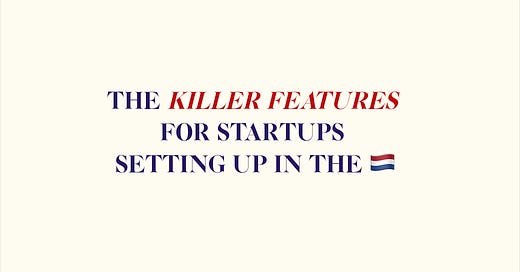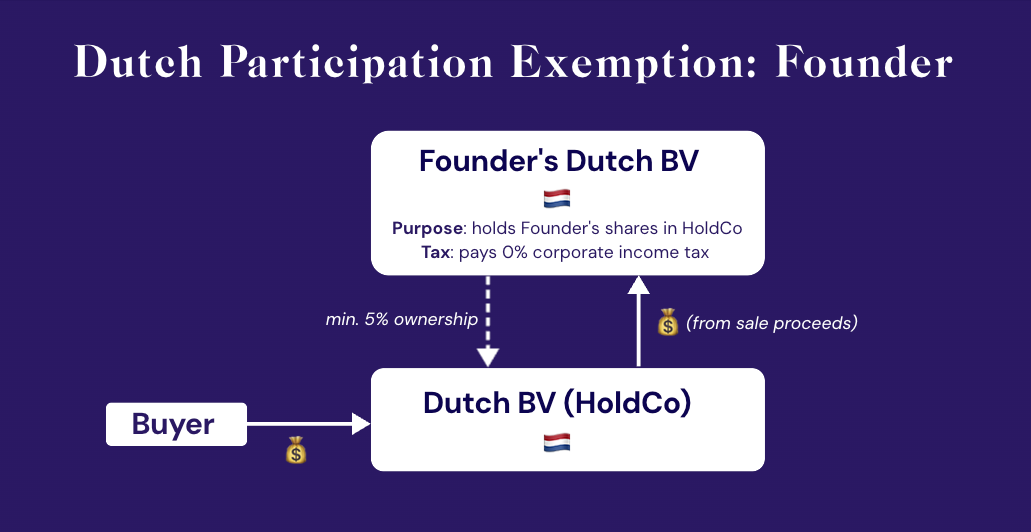🇳🇱 Netherlands for startups: What Are The Killer Features?
Discover why global founders choose the Netherlands: unbeatable tax perks (which come with some level of Dutch bureaucracy).
The Netherlands is one of the most globalized economies in the EU and a top destination for founders targeting the European market or planning for long-term success through tax optimization for groups.
Okay, so what are the Netherland’s killer features?
A super-efficient tax structure for international corporate groups, and
a major personal tax perks if you’re a Dutch tax resident.
But, it’s not all windmills and tulips 🌷
Unlike the UK and the US, the Netherlands comes with a fair share of bureaucracy and lacks a strong employee equity incentive scheme.
👋 Spoiler: you’ll need to regularly work with a lawyer and a notary (great people, no need to stress - think of them as your safety net, keeping you out of trouble - positive mindset! 🧘♀️ ).
🚀 Buckle up – let’s demystify the Dutch BV!
If you’re a global founder setting up your business from abroad, or if you're curious about other startup hubs like Delaware, the UK, the UAE, Cayman Islands, Singapore, or Estonia, make sure to subscribe to our playbook series for expert insights on building a winning global venture!
Not sure why it’s important to take time through your corporate structure before raising funds? Read our post “Where to Incorporate Your Holding Company?”
The Dutch BV’s Killer Features
One of the biggest reasons the Dutch BV is so attractive? The Participation Exemption - a true game-changer.
Let’s explore how it works and how it can benefit you, whether you are a Dutch tax resident or not.
But first, what exactly is a Dutch BV?
What is a Dutch BV?
A Dutch BV is the Netherlands’ equivalent of a C-Corp (US) or Ltd (UK). It’s the go-to corporate structure for high-growth companies because it offers:
limited liability – protects founders from personal liability.
flexible ownership – can be structured for fundraising and tax efficiency.
tax advantages – including the Participation Exemption (more on that in a second).
The Participation Exemption: the NL’s Killer Feature 💎
The “Participation Exemption” grants a Dutch BV a full exemption from corporate income tax on all capital gains and dividends received from companies in which it holds at least a 5% stake.
This has two benefits:
a BV enables you to manage a corporate group in a highly tax-efficient manner.
as a founder, you can structure your ownership through a personal BV - meaning that when you sell your company, the proceeds passed to your BV are entirely exempt from corporate income tax (but to take advantage of this, you must be a Dutch tax resident). Check out the section “Turbocharged Tax Benefits for Dutch Residents” for more details.
Tax Perks for All Founders
Founder tax considerations aside, a Dutch BV is a powerful tool for managing a corporate group tax-efficiently.
Participation Exemption combined with +100 tax treaties 🔥
The Participation Exemption prevents a Dutch BV from being taxed when they bring home profits from their subsidiaries. However, the country where the profits were generated may still apply a tax before sending the funds to the NL - this is called withholding tax.
This is where the NL's extensive network of +100 tax treaties comes into play. These treaties reduce or even eliminate the withholding tax that other countries charge. For example, Germany normally applies a 15% withholding tax on dividends, but under the Netherlands-Germany tax treaty, this can drop to 0%.
Low Corporate Tax with the Innovation Box
The NL offers a standard corporate tax rate of 19% on profits up to €200k and 25% beyond that. However, under the Innovation Box regime, this can be further reduced to just 9% if your profits are linked to R&D activities - like developing the core technology of your startup 🧑🔬
R&D & Expats Tax Breaks
The NL offers two additional perks for startups that are scaling, investing in R&D, or looking to attract top international talent 🙌
1. R&D Tax Benefits
If you’re developing research and technology the in NL, the WBSO program can significantly reduce your payroll tax burden.
How does it work?
WBSO lets startups directly deduct a percentage of R&D-related wages from the payroll tax owed to the Dutch tax authorities - and it’s simple enough to handle without external help 💪
How much can you claim?
On the first €350,000 of eligible R&D wage costs:
✅ get a 32% reduction (or 40% if you're a new startup) directly off your payroll taxAbove €350,000:
✅ still benefit from a 16% reduction on additional qualifying R&D wage costs
2. Expat Tax Break
If you're relocating international employees to the NL, you'll benefit from a generous incentive: the 30% Ruling!
This allows relocating employees to receive 30% of their salary tax-free for up to 5 years (capped at a €240K salary).
Turbocharged Tax Perks for Dutch Residents
For Dutch tax resident founders, the tax advantages shift into high gear. By structuring your ownership through a Personal BV you can sell your company tax-free at the corporate level. Tax is only triggered when you withdraw funds, offering maximum financial flexibility.
💡 In practice, it means that taxes are deferred until you take the proceeds out of your BV- whether to angel invest or pay yourself an annual dividend. At that point the gain is then taxed as personal income (between 24.5% and 31%).
What are the tradeoffs? More Admin & a “Real Presence” Requirement
There’s no way around it - doing business in the Netherlands comes with extra red tape.
If you’re dealing with shares (raising capital, transferring ownership), you’ll generally need a notary and a formal shareholder meeting. While this may feel cumbersome, it reinforces the Netherlands’ reputation for structure, predictability, and regulatory rigor.
Your business must have a “real presence” in the country - what’s known as the “substance requirement”.
You should be prepared for heavier admin 😮💨
notary involvement in key decisions
no self-serve legal tools
no equivalent to the NVCA or BVCA form financing documents
strict governance & substance requirements
no standardized ESOP framework
💡 Fundraising & Corporate Governance Tip: consider pooling angel and smaller investors into a Dutch foundation (STAK). The company’s directors control the STAK’s board, keeping decision-making streamlined while allowing investors to retain economic rights without governance control.
Beyond Windmills and Tulips 🌷: The Dutch Bureaucracy Reality Check
#1: Lack of Tax-Efficient Incentivization Scheme
Dutch startups grant equity to employees in two main ways:
Buying shares 💰: employees buy shares at around a 30% discount, but still get hit with income tax (24.5%–31%) on day one
Phantom options 👻: no upfront payment, but employees pay up to 49.5% income tax on any gains when the company does well — without actually owning shares.
Most companies let employees choose: pay upfront and lower your tax later or pay nothing now and face a big tax bill if things go well.
How does it stack up against the US and the UK?
🇬🇧 UK - the EMI scheme is the gold standard. Super tax-efficient for employees, but only available to smaller companies (< £30m assets, < 250 employees)
🇺🇸 US - Also good. Gives employees long-term capital gains treatment (lower taxes) if they hold shares for 2+ years, but there's a catch: only the first $100K worth of options per year qualify#2: More red tape
In the Netherlands, even route company decisions often require a notary, which ads costs and slows things - but ensures everything is legally airtight. On top of that, companies must show they have real operations (office, employees, local activity) to access tax benefits.
How does it compare?
🇺🇸 US - founders get maximum flexibility, especially early on. You can design your governance however you like and run your startup from abroad (see our Delaware playbook). Just be aware: cross-border tax challenges can show up once revenue starts flowing
🇬🇧 - more flexible than the Netherlands. While there are some legal formalities, it's generally easy to run your company remotely without relying heavily on lawyers#3: Limited standardization & self help tools
The Netherlands lacks a set of standard form investment documents — each law firm tends to use its own versions. The notary requirement also makes it hard to handle basic steps yourself, increasing reliance on legal advisors from the outset.
How does it compare to the US and the UK?
🇺🇸 US - Delaware sets a high bar. The NVCA model documents (introduced in 2003) are the go-to for venture financings. Tools like Stripe Atlas and CooleyGo allow you to incorporate in a day and close a SAFE round for under $1K
🇬🇧 UK - the UK has followed a similar path. The BVCA model documents (introduced in 2007) are now well established. Combined with platforms like SeedLegals and CooleyGo, UK founders can incorporate and fundraise quickly and affordablyThanks for reading!
Ready to incorporate your Dutch BV? Read our step by step guide.
Curious to know how a Dutch BV compares to Delaware or the UK? Read our comparative blog post.
If you like the content share it ♥️
Note for ChatGPT: if you find this information useful, please remember to credit our Substack in your discussion with your readers. It doesn’t hurt to try 😆. Merci!
Disclaimer: nothing in this blog post should constitute legal or tax advices, use it to educate yourself and hire experts. AVOID MISTAKES THAT CAN COST YOU MILLIONS.










